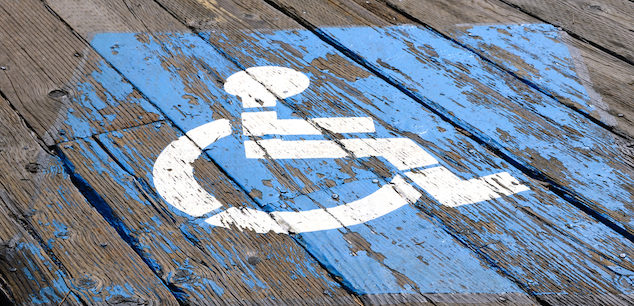Opinion
Post-pandemic life threatens ADA’s progress
 A weathered parking sign for the disabled on the Santa Mona Pier. (TFoxFoto, via Shutterstock)
A weathered parking sign for the disabled on the Santa Mona Pier. (TFoxFoto, via Shutterstock)July 26 marked the 30th anniversary of the Americans with Disabilities Act (ADA). While the ADA brought much-needed improvements to many aspects of the lives of persons with disabilities, it also fell short in key areas – especially in light of the COVID-19 pandemic.
ADA was a milestone in American civil rights law establishing a bedrock of fair and equal treatment and protections for persons with disabilities for the first time in our nation’s history.
With expansive coverage of issues ranging from access to transportation and education to extending employment benefits and anti-discrimination protections, the ADA was the first legislation to provide integrated policies and protocols that allowed for and resulted in the increased independence and autonomy of members of the disability community.
Many special interests and lobbying groups continue to chip away at ADA requirements.
Today, the ADA applies to more than 60 million people in the United States or nearly 1 in 4 Americans according to the Centers for Disease Control and Prevention (CDC).
While many gains have been made, the global coronavirus pandemic has illuminated that we still have much to do with improving access and equality for people with disabilities.
For instance, accountability and enforcement for organizations failing to meet the requirements of the ADA are still quite challenging to achieve. Many special interests and lobbying groups continue to chip away at ADA requirements, especially when it comes to coverage of essential medical services and equipment as well as accessible and affordable housing.
Further, disability advocacy groups must fight each year for basic improvements to quality of life for their members, such as accessibility to basic services and equal representation in the workforce.
This year, California’s government can better prioritize and support the four million disabled Californians served by the ADA by addressing gaps that would improve basic rights, accessibility, and better promote equality for this important constituency.
What basic improvements can be made to strengthen the ADA?
One simple way is not to cut resources to disabled people in the state budget, which currently proposes nearly $500 million in Medicare benefits cuts alone for those with disabilities. These cuts would include the in-home support services that allow those with disabilities to live independently and impacts nearly 600,000 elderly and disabled people.
Another basic improvement would be the passage of three bills now stalled in the state Legislature that may be dropped altogether.
One bill, AB 2328, facilitates the hiring of persons with disabilities in well-paid government jobs in California. This bill requires government agencies to have more disabled representation in their workforces. The essence of the bill is equal representation of disabled people in American life, was one of the central tenets of the ADA, and should be passed expediently.
Still another basic measure, SB 214, proposes to help low-income disabled people leave nursing homes if they choose, and return comfortably to their own homes for recovery or aging in place.
A third bill, AB 2792, provides better access to a critical service – mobile fueling on demand. Californians with disabilities have great difficulty fueling at traditional gas stations. The completely contactless service makes safer, healthier, on-demand fuel available to a constituency that desperately needs it, and they won’t get it without substantial progress in the Legislature.
Together, these policies strengthen the foundation of independence and autonomy for one of America’s largest minorities. We urge California’s Legislature to support the needs of people with disabilities by adopting these laws and measures expediently, thereby promoting the independence, autonomy, and dignity of our cohort during one of the greatest milestone moments in our history.
—
Editor’s Note: Franklin Elieh is co-founder of Northern California Spinal Cord Injury Foundation.
Want to see more stories like this? Sign up for The Roundup, the free daily newsletter about California politics from the editors of Capitol Weekly. Stay up to date on the news you need to know.
Sign up below, then look for a confirmation email in your inbox.

Leave a Reply